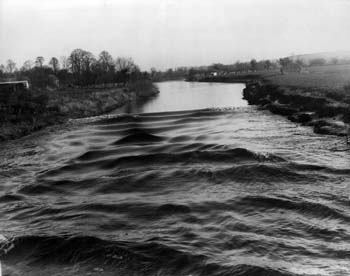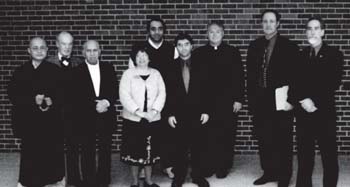 This year, Feb. 9 combined Ash Wednesday with the Buddhist lunar New Year.
This year, Feb. 9 combined Ash Wednesday with the Buddhist lunar New Year.
Both festivals represent journeys — for Christians, Lent is always a sorrowful time, but after the Dec. 26, 2004 tsunami that wiped out Christians, Muslims and Buddhists alike, the turn of the year was particularly poignant because of the lives lost and the toil that lay ahead.
On an unseasonably warm winter day in Wichita, half a world away from the tragedy, a diverse group of individuals gathered in the Rhatigan Student Center Ballroom to commemorate not only the nations worst hit, but the terrible loss to the entire human family.
Presenters at the small memorial service, which was organized through Campus Ministries, were two rabbis, a Catholic priest, a Buddhist monk, Hindu and Muslim leaders, Rev. Martha Sanchez, WSU campus minister, and Peter Zoller, WSU associate vice president for academic affairs, who shared the artistic response to death, reading John Donne’s “Death Be Not Proud” and Dylan Thomas’ “And Death Shall Have No Dominion,” fittingly about sailors who perish in the waves.
Despite their religions’ historical friction — even hostility — the speakers at the memorial presented a unified front of turning to the heavens for solace, not responsibility.
Searching for Answers
“Where was God in the tsunami?” asked Rabbi Nissim Wernick. It was the wrong question, he said — the terrible wave was only “nature going about its business,” not a judgment. “Where are we in the tsunami?” he went on. “What have we done? God is found in the transformation of chaos into order, sanity and love. God is found in the manner in which we will respond.”
His sentiments were echoed by Father Michael Nolan, WSU graduate student in history, priest at St. John’s Catholic Church and interfaith minister for the Diocese of Wichita. “When one part of the body of mankind suffers, the whole body suffers,” he said. Human beings need to reach out and help one another.
Reaching Out
Answering Wernick’s challenge, Wichita State alumni, faculty and students have participated in many aspects of the worldwide relief effort. Sri Lankan and Indian community members have organized fundraising for their ravaged homelands. Some, such as electrical engineering professor Sudharman Jayaweera, have been directly affected — although his immediate relatives are safe, 14 of his cousins, aunts and uncles were killed.
Three days after the tsunami, Jayaweera reached out for help for his native Sri Lanka.
In an e-mail message, he wrote, “As someone coming from one of the southern coastal towns badly hit by the tsunami, Matara, I know that neither the regional authorities nor the Sri Lankan government have the required resources to cope with a horrific disaster of this magnitude. From the survivors there, I have learnt that people are living in temporary shelters at schools and Buddhist temples. After everything was washed away by the sea, most people do not even have dry clothes to wear. The roads are damaged, rail-lines are destroyed and the area stinks as a prelude to the spread of waterborne diseases ...
… Hospitals do not have enough medical supplies and doctors. Worse yet, most hospitals are coping with the incoming flood of dead bodies. It is in these tragic circumstances, we see the spirit of humanity. The good people from all over the world are extending their hands to these unfortunate people. If we do not help them right now, thousands of orphaned children who battled the fury of the waves to survive face the threat of losing to inevitable waterborne diseases. Please help.”
Jayaweera’s message ended with a contact list for four disaster relief funds — and this thought: “The important thing is that we all contribute. No amount is small.”

for those lost in the Dec. 26, 2004 tsunami that
devastated southeast Asia are representatives of
the Buddhist, Hindu, Muslim, Jewish and Christian
faiths. Rev. Martha Sanchez, fourth from left, of
WSU’s Campus Ministries, was a key organizer.
The need is not only overseas. Many international students at WSU have seen the prospects of continuing their education threatened by the tsunami, as their families’ and sponsors’ businesses and assets were swept away.
To combat this, the Office of International Education has set up a fund specifically for WSU students and staff affected by the tragedy. The WSU Tsunami Relief Fund will accept cash or checks mailed to Campus Box 122, 1845 Fairmount, Wichita KS, 67260. All proceeds will go directly to those in need.
Andrea Neff, a member of the WSU National Residence Hall Honorary, is spearheading efforts for a fundraising event April 4-8 to benefit the fund.
Neff explains, “NRHH is sponsoring a ‘penny war’ in which campus departments compete to raise the most money. Any denomination of money will be accepted, and everyone who enters a participating office is welcome to donate.”
One of the donation jars will be prominently displayed in the main foyer of the Woodman Alumni Center, which houses the WSU Foundation, the WSU Board of Trustees and the alumni association. In addition, the Division of Student Affairs has established the Tsunami Student Support Fund.
Across Cultures
While Christians and Jews were among the hundreds of thousands dead in Asia, most belonged to Eastern religions — Buddhism, Hinduism and Islam.
Their cultural compatriots in Wichita paid their respects in their own distinctive ways at WSU’s memorial service.
Monk Thich Giac Minh for the Wichita Buddhist Association, shy of his English, spoke through a female interpreter at first, then led the group in silent meditation and a traditional chant; joining him was a row of congregants, mostly Vietnamese, who sang in uncertain but clear voices.
Prem Bajaj, WSU professor emeritus of math and statistics who spoke for members of the Hindu Society, urged mourners to hand over their burden to God and continued Wernick’s and Nolan’s theme, saying, “To love mankind is the same as loving God.”
Mehmet Barut from the Institute of Interfaith Dialog, also a WSU assistant professor in finance, real estate and decision sciences, spoke from the Muslim perspective.
In the wake of staggering tragedy, services like this one are necessary for many people, allowing them to work through their grief in community. Wichita State’s international appeal puts it in a unique position — it is connected to all corners of the world.





